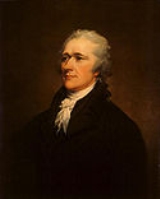
, soldier, economist
, political philosopher, one of America's first constitutional law
yers and the first United States Secretary of the Treasury
. As Secretary of the Treasury, Hamilton was the primary author of the economic policies of the George Washington Administration
, especially the funding of the state debts by the Federal government, the establishment of a national bank, a system of tariffs, and friendly trade relations with Britain.
For my own part, I sincerely esteem it a system which without the finger of God, never could have been suggested and agreed upon by such a diversity of interests.![]()
It has been observed that a pure democracy if it were practicable would be the most perfect government. Experience has proved that no position is more false than this. The ancient democracies in which the people themselves deliberated never possessed one good feature of government. Their very character was tyranny; their figure deformity.![]()
Here, sir, the people govern; here they act by their immediate representatives.![]()
Every power vested in a government is in its nature sovereign, and includes by force of the term a right to employ all the means requisite...to the attainment of the ends of such power.![]()
If the end be clearly comprehended within any of the specified powers, and if the measure have an obvious relation to that end, and is not forbidden by any particular provision of the Constitution, it may safely be deemed to come within the compass of the national authority.![]()
If it be asked, What is the most sacred duty and the greatest source of our security in a Republic? The answer would be, An inviolable respect for the Constitution and Laws — the first growing out of the last... A sacred respect for the constitutional law is the vital principle, the sustaining energy of a free government.![]()
The passions of a revolution are apt to hurry even good men into excesses.![]()
I have thought it my duty to exhibit things as they are, not as they ought to be.![]()
Men are rather reasoning than reasonable animals, for the most part governed by the impulse of passion.![]()
A garden, you know, is a very usual refuge of a disappointed politician. Accordingly, I have purchased a few acres about nine miles from town, have built a house, and am cultivating a garden.![]()

